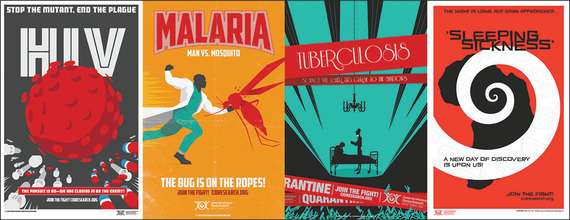Mankind vs. Pathogen.
This idea--the ages-old, microscopic battle between parasites, bacteria, viruses and human immune systems--is the essence of the science performed by myself and so many other infectious disease researchers.
Winning this battle, advancing the knowledge and cures necessary to ultimately defeat global diseases, is precisely where our work is focused.
Inspired by the battle our scientists wage against deadly disease-causing pathogens, we have developed a series of posters to capture the spirit of this battle of "Human vs. Pathogen". Our aim is to highlight the creativity, imagination, and passion that infectious disease scientists bring to this battle each day--and the optimism we see right at the epicenter of the struggle.
The posters were a true collaboration between art and science, developed by our team at the Center for Infectious Disease Research and our design partner, Motive. The design muse stemmed from a combination of World War-era public health propaganda posters, classic movie posters, and comic book imagery.
We are scientists. That's to say, this kind of art-driven project is entirely new for us. At the most basic level, we hope to capture a few imaginations, pique curiosity, and ultimately encourage more people to be advocates for infectious disease science, in every medium.
Why is this important?
It is an interesting time to work in the field of infectious diseases. Zika and Ebola captured the world's attention and concern like nothing we've seen since the dawn of the AIDS pandemic.
With the eyes of the world on these diseases, mountains were moved. Research dollars flowed in, red tape was cut, and the resulting forward progress over the ensuing months and years--researching and understanding the viruses, developing a pipeline of potential cures--amounts to more than has occurred in the previous decades for these diseases.
What this plainly demonstrated to me was the importance of public attention. When our will is there, when we are focused, when we have the imagination to see that life can fundamentally improve, we achieve great results for our collective health and safety.
The problem is that we perpetually find ourselves reacting to crises, when it is already too late to prevent tragedy. What this represents is a crisis of imagination--and it's one of the biggest challenges we face.
"Old news" diseases are often relegated to the back page. The tidal wave of attention we've seen for Zika and Ebola is precisely what we need for other global diseases that quietly continue to have an astronomical, sustained human impact, such as HIV, TB, and malaria. Infectious diseases claim the lives of 14 million people each year. To put that in perspective, this is somewhere near the population of the four biggest cities in the US. Combined.
Our reactive human nature also undercuts the best opportunity we have to combat these diseases: scientific research.
Improving our world's health starts with science. Period.
We cannot combat infectious diseases if we don't understand how they operate and interact with our immune systems. Despite this, little to no research was conducted on the Zika virus, even though it was first discovered in 1947. Centuries later, many unanswered questions remain with tuberculosis and malaria as well.
Today, science is propelling new discoveries every day that hold the potential to save lives. Right now our teams at the Center are performing experiments with potential drugs for Zika, while also prepping a promising malaria vaccine candidate for early next year. These are just two examples.
We know the great influence we can have when more of us pay attention and raise our voice. There is no better time than right now to "join the fight" and champion the science necessary to create a healthier, safer world.
You can support life-saving science by reaching out to your local elected officials.
Receive your own high-resolution digital version of the "Human vs. Pathogen" poster series with a $25 donation here. All proceeds will benefit the work of the Center for Infectious Disease Research.
